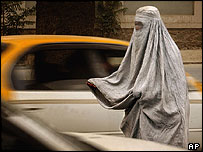By Andrew North
BBC correspondent in Kabul
Thursday, 7 October, 2004
Forty per cent of the registered voters for Saturday's presidential election in Afghanistan are women - so why is there so little debate about women's rights?
BBC

A woman begs on the streets of Kabul
|
In a bleak and run-down part of eastern Kabul, aid workers call out to a group of poor women waiting for food handouts.
One by one, they collect a ration of flour, salt and cooking oil.
It is supposed to last them and their children for the next month because they all have something in common - they are widows.
In Afghanistan, losing your husband can mean destitution for women.
Many are abandoned by their families. Unable to work, they depend on support programmes like this one run by the aid agency Care.
Hanifa lost her husband four years ago in a rocket attack.
"I'm totally alone. I have no support and I have six children, with no one to help me. All I have is this ration card from Care. Sometimes I feel like killing myself."
But Care is trying to find ways for these widows to earn an income - with chickens.
They are each given a brood of 30 chicks, poultry feed and advice. Zermina is now making about $30 a month from selling the eggs from her grown hens.
"It has made life a lot easier," she says.
"I can get food now for all my children. And I have eight children, four of them blind."
The advantage is these women can earn this money at home - rather than taking the risk of offending local sensibilities by working, in often conservative neighbourhoods.
Beaten regularly
But across Afghanistan, deep-seated male attitudes towards women force many to suffer far more.
Fatima - not her real name - describes how she was beaten regularly by her brothers, while a refugee in Iran.

Woman leaving a centre that teaches people how to vote
|
She fled, but then returned home - only for the beatings to get worse. Because, Fatima says, her family believed their reputation had been damaged by having a daughter who had been out alone.
"They think that I'm guilty, that I left home. But in fact they forced me to leave home.
"They were beating me but they don't understand that and now they saying: 'You are guilty.'
"Because of their honour they don't want to be faced with other family members. They want to kill me."
Alone and penniless, Fatima ended up as a prostitute. But after being caught by Iranian police, she was handed over to the Afghan authorities, and suffered more terrible treatment.
Two months ago, some police took pity on her. Fatima is now in a refuge in Kabul for battered women, its location a closely kept secret.
Ashamed of daughter
Meena - again not her real name - is in the same shelter. She's well educated and had a good job.

UN staff registering Afghan refugees to vote in neighbouring
Pakistan
|
But that's all gone, Meena says, after a man who had said he wanted to marry her raped her - and her family found out.
"My brother and father locked me in the house, and my brother beat me. Then they took me to the police station.
"I told them this man had promised to marry me. The police spoke to him and I was shocked when he said he didn't know me.
"My father and brother were furious."
The police made things even worse, Meena says, by telling her father he should be ashamed of having a daughter like this.
"When we got home, my father said he wanted to kill me. And my mother said I can't help you, you've done this to yourself."
Meena decided she had to leave home, as soon as she got a chance.
'Complete impunity'
Such cases are far from unusual - in fact they're commonplace.
|
Habiba Sarabi
Women's affairs minister |
"There is no established mechanism for men who are violent to be brought to justice. The best way, I think, to understand it for a European audience is that it's really like medieval England."
So biased against women is the system that Ms Wareham herself was detained by the Afghan authorities when she tried to help another woman who had been mistreated by her family.
The Minister for Women's Affairs, Dr Habiba Sarabi, admits there's a long way to go.
"We have to change the law but education is also very, very important. It's fundamental.
"Changing the attitudes of men rather than women because this is a male dominated country and men should change their mind towards the women."
But so ingrained are these attitudes, the minister believes, that pushing too hard risks a backlash.
And that is also why most of the candidates running for the presidential election have avoided taking a firm position on women's rights.